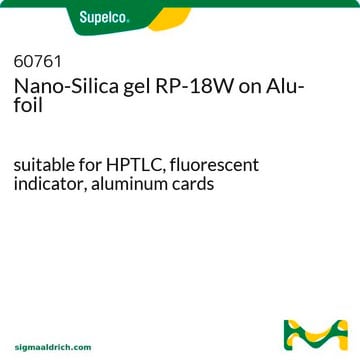1.05914
HPTLC plates, Silica gel 60 RP-18
pkg of 25 plates, plate L × W 20 cm × 10 cm, glass support
Synonym(s):
High-performance thin-layer chromatography plates
Sign Into View Organizational & Contract Pricing
All Photos(1)
About This Item
UNSPSC Code:
41115711
NACRES:
NB.21
Recommended Products
material
glass support
silica gel 60 matrix
Quality Level
feature
binder Organic Polymer
fluorescent indicator: no
packaging
pkg of 25 plates
technique(s)
thin layer chromatography (TLC): suitable
layer thickness
200 μm
plate L × W
20 cm × 10 cm
particle size
5-6 μm
pore size
60 Å medium pore diameter
storage temp.
2-30°C
Related Categories
General description
25 Glass plates 20 x 10 cm
RP modified plates serve two purposes: act as a pilot method for HPLC and allow to choose various solvent system for special separations. Our RP-modified silica layers are well suited for many separation challenges that unmodified silica cannot overcome. These layers use aqueous solvent systems to separate extremely non-polar substances and analyze particular polar substances that can adapt to ion-pair chromatography. What’s more, RP-modified silica layers are less dependent on atmospheric humidity. Unlike unmodified silica, RP-phases do not exhibit catalytic activity. This makes them the plates of choice for unstable substance that tend to experience oxidative degradation.
Application
- Densitometric HPTLC method for qualitative, quantitative analysis and stability study of Coenzyme Q10 in pharmaceutical formulations utilizing normal and reversed-phase silica gel plates.: This study presents a high-performance thin-layer chromatography (HPTLC) method for analyzing Coenzyme Q10 in pharmaceutical formulations. The method employs both normal and reversed-phase silica gel plates to achieve qualitative and quantitative analysis, as well as stability testing of Coenzyme Q10 (Abdel-Kader et al., 2016).
- Simultaneous Quantification of Gymnemic Acid as Gymnemagenin and Charantin as β-Sitosterol Using Validated HPTLC Densitometric Method.: This research develops a validated HPTLC densitometric method for the simultaneous quantification of gymnemic acid and charantin in herbal formulations. The method utilizes silica gel 60 F₂₅₄ plates for effective separation and quantification (Ahamad et al., 2015).
- Estimation of catechin in Ayurvedic oil formulations containing Acacia catechu.: The study estimates the content of catechin in Ayurvedic oil formulations using HPTLC. Silica gel 60 F₂₅₄ plates are employed to ensure accurate quantification of catechin in these formulations (Dubey et al., 2009).
- Development and validation of HPTLC method for estimation of tacrolimus in formulations.: This paper details the development and validation of an HPTLC method for estimating tacrolimus in pharmaceutical formulations. The method uses silica gel 60 F₂₅₄ plates for efficient separation and quantification of tacrolimus (Borhade et al., 2009).
- Estimation of berberine in ayurvedic formulations containing Berberis aristata.: The research focuses on the estimation of berberine in Ayurvedic formulations. Using HPTLC with silica gel 60 F₂₅₄ plates, the study provides a reliable method for berberine quantification (Rout et al., 2008).
Linkage
Replaces: 5914-6; 5914
Analysis Note
Specific surface area (according to BET; 5-Pt. measurement): 480 - 540 m²/g
Pore volume (N₂-isotherm): 0.74 - 0.84 ml/g
d 50 (laser diffraction, size distribution): 5 - 7 µm
Layer thickness: 150 - 200 µm
Deviation of layer thickness per plate: ≤ 35 µm
Chromatographic testings:
A) Cholesterin test
hRf-values
- cholesterin, cholesterin test:
13 - 23
B) Steroid test
- methyltestosterone, steroid test: 20 - 35
- Reichstein S, steroid test: 50 - 65
- hydrocortisone, steroid test: 65 - 80
Typical value determined on an activated plate (120°C, 15 min)
Eluent a) aceton/ water (95/5 v/v)
Eluent b) acetonitrile/ water (70/30 v/v)
Pore volume (N₂-isotherm): 0.74 - 0.84 ml/g
d 50 (laser diffraction, size distribution): 5 - 7 µm
Layer thickness: 150 - 200 µm
Deviation of layer thickness per plate: ≤ 35 µm
Chromatographic testings:
A) Cholesterin test
hRf-values
- cholesterin, cholesterin test:
13 - 23
B) Steroid test
- methyltestosterone, steroid test: 20 - 35
- Reichstein S, steroid test: 50 - 65
- hydrocortisone, steroid test: 65 - 80
Typical value determined on an activated plate (120°C, 15 min)
Eluent a) aceton/ water (95/5 v/v)
Eluent b) acetonitrile/ water (70/30 v/v)
Certificates of Analysis (COA)
Search for Certificates of Analysis (COA) by entering the products Lot/Batch Number. Lot and Batch Numbers can be found on a product’s label following the words ‘Lot’ or ‘Batch’.
Already Own This Product?
Find documentation for the products that you have recently purchased in the Document Library.
Customers Also Viewed
Our team of scientists has experience in all areas of research including Life Science, Material Science, Chemical Synthesis, Chromatography, Analytical and many others.
Contact Technical Service




